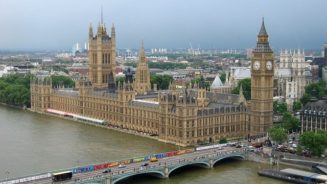UK chancellor Rachel Reeves has confirmed she will make some changes to the non-dom reforms announced in the Autumn Budget.
Speaking at the World Economic Forum in Davos, she committed to tabling an amendment to the Finance Bill which could remove some of contentious elements of its changes to non-dom taxation though there is little detail to go on.
Reeves is widely quoted as saying that “we have been listening to the concerns that have been raised by the non dom community”.
In early reaction amid scant detail on what tweaks she might make, Stephen Kenny, head of private client at audit and accountancy firm PKF Littlejohn said: “This very much feels like too little too late. The changes to the non-dom rules were first announced by the previous government in March 2024. Since then, many in the industry raised the likely impact these changes would have, and the new government has had the opportunity to reassure the internationally mobile community that the UK is open for business. But they have not heeded the warning until too late.
“Having worked with non-domiciled High Net Worth individuals for most of my career one of the key benefits the UK used to offer was certainty and a stable tax regime. This has been eroded by successive changes to the non-dom regime which have, for the most part, have not been managed as effectively as they could have been. The feedback I get from people wanting to leave the UK is that they are not only unhappy because of changes in the tax regime but because they have no confidence that it won’t change further in the future.
“I doubt this announcement will do much to change people’s opinion. If the government is serious about keeping the UK open for business they should be taking the opportunity to engage with advisors to create a fair regime that will work for the UK and allow people to effectively plan for the future.”
Anthony Whatling, managing director at Alvarez & Marsal Tax, said: “The announcement by Rachael Reeves that the Government will introduce amendments to the proposed non-dom changes is very welcome. It is reassuring to hear that the Government is listening to the concerns raised by non-doms and industry experts about the potential exodus of wealthy individuals from the country.
“However, it appears that the only amendment planned is to extend the “temporary repatriation facility,” allowing taxpayers to bring their historic income and gains to the UK at a reduced tax rate. While we await the specifics of these changes, it is doubtful that this measure alone will significantly stem the outflow of wealthy non-doms.
“A major concern remains that limiting tax benefits to the first four years in the UK makes the country relatively unattractive. Extending this four-year limit for new arrivals, perhaps in conjunction with an annual tax charge similar to the successful Italian regime, could better attract and retain internationally mobile ultra-high-net-worth individuals who contribute significantly to the local economy.”
Charlie Sosna, Head of Private Wealth and Tax at Mishcon de Reya, said: “Clients in and outside the UK will welcome the statements from the Chancellor. There has certainly been a feeling amongst many clients that the rules as proposed do not make the UK an attractive place for them to remain.
“Many significant clients have looked to relocate to their home countries, or other countries looking to attract their talent and wealth (such as Italy, Switzerland and Monaco). We certainly have many client families and their family offices who wish to review their position in the UK and are seeking assistance in relocating to other jurisdictions as a response to the abolition of the ‘non-dom’ regime’.
“It is important to remember that these clients do, and are very happy to, contribute and pay their way in society. However, the Government must balance that against offering a regime that entices them to relocate to or stay in the UK rather than simply remain in their home countries.
“Separately, the new rules have not gone far enough to entice many entrepreneurs and wealth makers to relocate themselves, their businesses and their families, from their home countries or elsewhere to the UK. Instead, they have created a regime that could attract people to come to the UK for a short period of time, contribute very little if anything in tax contribution to the UK, and then look to leave the UK once their favourable tax position ends. As a result, we have seen a slowdown in those looking to relocate to the UK with many looking at the UK with some scepticism and querying whether they and their businesses are truly welcome here.
“Given the Government’s desire to attract these people, it is understandable that they have taken stock of the reaction and decided to act to minimise the loss of these individuals and seek to convince those abroad that the UK is where they want to live and invest. We welcome any changes the Government may introduce to address these issues and ensure there is a regime where all contribute to society and ‘pay their way’, but in a way that incentivises them, their families and their businesses and investment to pick up sticks and come to, and remain in, the UK.”
Carol Katz, partner in the Private Wealth and Tax group at Mishcon de Reya, added: “In terms of the impact of the current proposed rules on the internationally mobile, we have seen an increase in the number of enquiries from existing and new clients who are looking to relocate out of the UK: the departure lounge is very much fuller than arrivals at present!
“Expanding the temporary repatriation facility could encourage more people to stay in the UK as the reduced tax rate (either 12% or 15%, depending on the year in which it is designated) is a significant carrot with which to encourage people to bring funds here to settle for the long term. Our clients would want to see the detail before changing their plans and time is running out.
“The new regime will be attractive to people looking to stay in the UK for only a short period in order to take advantage of four years of 100% tax relief on their foreign income and gains. However, four years is a short time to base a decision to relocate a family, with many people looking at Italy, Switzerland and Dubai as alternatives to the UK.”
Marc Acheson, global wealth specialist at Utmost Wealth Solutions, said: “The measures announced at the Budget made the UK far less attractive to non-doms and created the perfect storm of many leaving and less coming in. The replacement of the current remittance basis with the new 4-year foreign income regime encouraged the wrong type of behaviours and gave little incentive for people to come to the UK and establish long-term roots.
“Many of our clients have been exploring other jurisdictions in the EU and UAE. This community would rather not leave the UK and contribute significantly to the exchequer, so any review of those changes, particularly with reference to the erosion of IHT protections on existing settlements would be welcome.”
Rachel De Souza, tax partner at audit, tax and consulting firm RSM UK, said: “I welcome Rachel Reeves’ acknowledgement that concerns have been raised by the non-dom community to the changes due to come in on 6 April. Whilst an increase to the temporary repatriation facility must be a good move, it is woefully inadequate to prevent wealthy non-dom and British entrepreneurs from leaving the UK.
“The way to stem this exodus would be to maintain the exemption from IHT to offshore trusts but also reverse the proposed changes to agricultural and business property relief which impacts the farmers and entrepreneurs.”
Philip Munro, partner at Withers on whether they could change wealthy people’s attitude to staying in the UK: “As set out in the 2024 Budget, the new rules will be available for a limited period from 2025 to 2026.
“The tax rate will be 12% for the first two years and 15% in the final tax year of operation. This may be helpful to some individuals who have previously claimed the remittance basis, but it is unlikely that revisions to the terms will impact on the decision-making where individuals are considering leaving the UK.
“The decision to leave the UK and to be non-resident is generally taken for one or both of two reasons:
1. One is simply that a move to worldwide taxation on income and gains in the UK is not acceptable. There are many countries which offer lower tax rates and can incentivise entrepreneurs to relocate to them. The non-dom tax reforms only offer a four-year period during which full UK tax is not applicable and that is only for those who are moving to the UK (and generally not to those already living here); and
2. Inheritance tax – there may be a positive incentive to leave the UK now in many cases to avoid a 40% inheritance tax exposure applying on worldwide assets. The non-dom tax reforms have a potential IHT ‘tail’ of up to 10 years for those who leave the UK in the future and this may well be unacceptable to many wealthy and internationally mobile individuals.
“If the Government wants to stop non-dom individuals leaving the UK, measures on these points would also be required.”
Mauro De Santis Bo, partner at GSB Wealth said: “The proposed softening of the non-dom rules is likely aimed at preventing the loss of high-net-worth individuals who contribute significantly to the UK’s economy.
“By extending the temporary repatriation facility to three years and slightly lowering the tax burden during this period, the government is sending a signal that the UK remains a welcoming place for global wealth. Although this may look like it is going to help retain wealthy individuals who might otherwise move their funds elsewhere, I believe that is only helping those non-doms that are already thinking of staying and they have been lobbying intensively over the past months to make the new rules slightly more favorable for them.
“There’s no denying that the initial uncertainty and proposed tightening of the non-dom regime have already pushed some individuals to leave the UK or reconsider their long-term commitment to the country. Wealthy individuals value stability and clarity in tax policy, and many will have already acted on the earlier announcements, relocating funds or even themselves to jurisdictions with more predictable regimes.
“This softening can be seen as a positive step, but for those who have the decision of leaving or already left, it may be too late to reverse their decisions and I doubt this ‘softening’ will be enough to make them change their minds. The UK now faces a challenge in rebuilding trust among this community and demonstrating that it can balance fiscal needs with a competitive, business-friendly environment. Timing is everything, and a stronger, clearer commitment to welcoming global wealth sooner could have mitigated the damage.”




